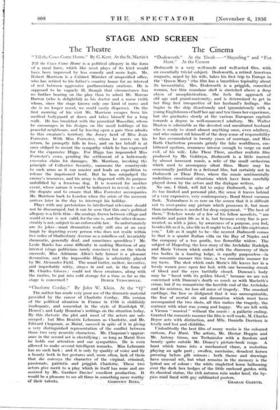STAGE AND SCREEN
The Theatre
" Till the Cows Come Home." By G. Kerr. At the St. Martin's
Till the Cows Come Home is a political allegory in the form of a rural farce, which like most plays of its kind would have been improved by less comedy and more logic. Mr. Robert Marrison is a Cabinet Minister of unspecified office, who has retired to his father's country house for an interval of rest between aggressive parliamentary orations. He is supposed to be vaguely ill, though that circumstance has no further bearing on the play than to admit Mr. Marcus Barron (who is delightful) as his doctor and a nurse (with whom, since the stage knows only one kind of nurse and she is no longer novel, we could easily dispense). On the first morning of his visit Mr. Marrison escapes from his medical bodyguard at dawn and takes himself for a long walk. He has breakfast with the parochial Mussolini, whom he encourages in his designs on the small holdings of his peaceful neighbours, and by leaving open a gate then admits to this creature's territory the Jersey herd of Miss Joan Forrester. With Miss Forrester, whom he meets on his return, he promptly falls in love, and on her behalf is at once obliged to recant the sympathy which he has expressed for the expansive Higgs. For Higgs has impounded Miss Forrester's cows, pending the settlement of a ludicrously excessive claim for damages. Mr. Marrison, invoking the principle of Collective Security, summons the countryside to such arms as it can muster and leads an expedition to release the imprisoned herd. But he has misjudged the enemy's resources, and his army is dispersed with its purpose unfulfilled by a ferocious dog. It is reserved for another event, whose nature it would be indiscreet to reveal, to settle the dispute and to ensure that Miss Forrester accompanies Mr. Marrison back to London when the crisis of the moment arrives later in the day to interrupt his holiday.
Plays with any pretensions to intellectual relevance should not be discouraged, but it can be seen that this one's political allegory is a little thin—the analogy drawn between village and world at war is not valid, for the one is, and'the other demon- strably is not, subject to an enforceable law. So unfortunately are its jokes—must dramatists really still: aim at an easy laugh by depicting every person who does not reside within five miles of Shaftesbury Avenue as a mindless oaf, invariably rheumatic, generally deaf, and sometimes speechless ? Mr. Leslie Banks has some difficulty in making Marrison of any interest (stage politicians rarely convince) but on the whole succeeds, Miss Adrianne Allen's lady farmer is a pleasant decoration, and the impossible Higgs is admirably • played by Mr. Alexander Field. The usual butler, mellow, inventive, and improbably witty, strays in and out, in the form of Mr. Charles Groves : could not these creatures, along with the rustics, be put into cold storage for a time so far as the
stage is concerned ? DEREK VERSCHOYLE.
"Charlotte Coiday." By John W. Klein. At the "Q" The author has made very poor use of the dramatic material provided by the career of Charlotte Corday. His version of the political situation in France in 1793 is childishly inadequate, and somewhat in the style of Randolph W. Hearst's and Lady Houston's writings on the situation today. By. this rhetoric the plot and most of the actors are sub- merged ; but Miss Beatrix Lehmann as Charlotte, and Mr. Edward Chapman, asMarat, 'succeed in spite of. it in giving a very distinguished representation of the conflict _between those two .very neurotic characters. Mr. Chapman's appear- ance in the second act is electrifying ; so long as Marta lives he holds our attention and our sYmpathies.- He is even allowed to make .several intelligent remarks. Miss Lehmann has no such luck ; and it is only by quality of voice and bey a beauty both in her gestures and, more often, lack of theni that she conveys the Character of the virginal, criminal, passionate, patriotic and priggish Charlotte. Theie two actors give merit to a play which in itself his none and are assisted by Mr. Gardner Davies' excellent Prochiction. It would be a pleasure to see all tliiee in soMething more worthy














































 Previous page
Previous page